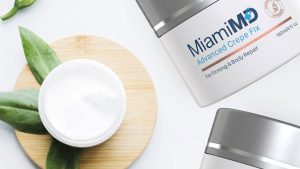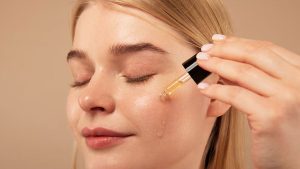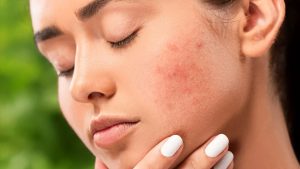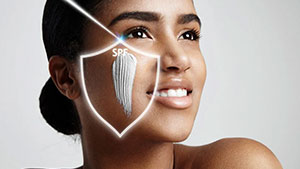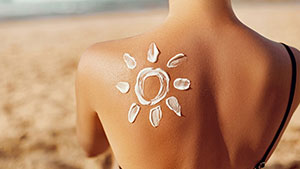Does Sunscreen Prevent Aging?
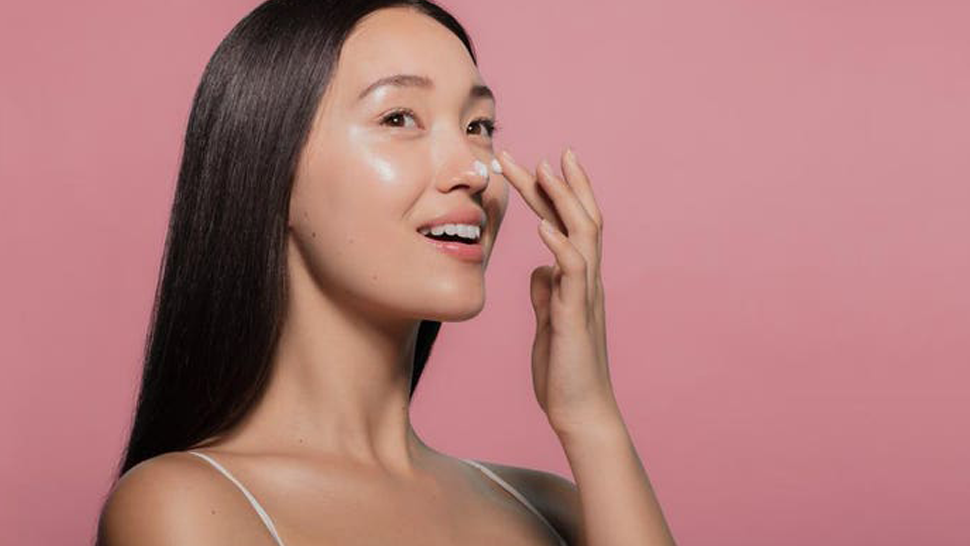
You’ve probably heard a lot about sunscreen and how important it is for protecting against skin damage. But did you know that daily sunscreen use can also help prevent aging? It’s true.
A 2013 study found that about 80% of visible aging signs — like wrinkles, fine lines, dark spots, uneven texture, and sagging — are caused by UV exposure (1). So, sunscreen is a powerful tool for keeping your skin looking youthful for longer.
Today, we’ll explore how sunscreen can support skin health and prevent premature aging, what types of sunscreen are out there, and how you can make sure you’re using it the right way.
What Is Photoaging?
Photoaging is the process of skin aging caused by sun exposure. The sun’s ultraviolet (UV) rays can damage your skin over time. “Photoaging manifests as fine lines, deep wrinkles, dark spots or pigmentation, sagging and thickened skin that loses its elasticity,” explains Dr Catriona Maybury, consultant dermatologist (2).
Photoaging happens because UV rays break down the collagen in your skin, which keeps it firm and smooth. When the collagen breaks down, your skin starts to sag, and wrinkles appear.
UV rays also cause inflammation, which speeds up the breakdown of your skin’s protective barrier. This makes your skin more vulnerable to other problems, such as dryness, redness, and irritation. In short, photoaging is all about how the sun harms your skin and makes it age faster than it would naturally.
Can Sunscreen Prevent Premature Aging?
Sunscreen application can help protect your skin from photoaging. When you apply topical sunscreen, it acts as a shield against harmful UV rays. By blocking these rays, sunscreen can prevent the damage that causes premature aging.
In fact, wearing sunscreen every day is one of the best ways to keep your skin looking young and healthy. It helps protect your skin from the sun’s damaging rays, which means it can reduce the appearance of fine lines, wrinkles, and dark spots.
Even if you are someone who spends a lot of time outdoors or lives in a sunny area, sunscreen can still help. “The earlier you address sun damage, the more likely you may be able to reverse some of the possible consequences,” says Dr. Mitchell (3). When you use sunscreen consistently, you protect your skin from the sun’s harmful effects and reduce the risk of premature aging.
While sunscreen doesn’t reverse aging, it can certainly help manage the signs of aging caused by sun exposure. By blocking UV rays, sun lotion helps keep your skin from getting damaged, allowing it to maintain its youthful appearance for longer. Sunscreen can also improve the overall health of your skin, helping you look and feel your best.
What Signs of Aging Can Sunscreen Help Manage?
Sunscreen can be especially helpful for managing the visible signs of aging. Some of the most common signs of aging that sunscreen can help with include:
Fine Lines
Fine lines are small wrinkles that appear as the skin starts to lose its firmness and elasticity. Sun exposure is one of the main causes of fine lines, especially around the eyes and mouth. When you wear sunscreen, you reduce the chances of developing fine lines because it protects your skin from UV rays that break down collagen.
Hyperpigmentation
Hyperpigmentation refers to dark spots on the skin, also known as age spots or sun spots. These spots can appear on your face, hands, and other areas that are regularly exposed to the sun.
Over time, the sun’s UV rays can trigger your skin to produce too much melanin, the pigment that gives your skin its color. This leads to uneven skin tone and dark spots. Sunscreen helps prevent hyperpigmentation by blocking UV rays and preventing further damage to your skin.
Additional Benefits
Besides helping with aging signs, sunscreen has other important benefits for your skin. It’s essential for protecting your skin from skin cancer, which can result from overexposure to UV rays. UV rays can damage the DNA in your skin cells, which can lead to cancerous growths.
Wearing sunscreen regularly can lower your risk of developing skin cancer by protecting your skin from this harmful exposure.
In addition, sunscreen helps to maintain your skin’s moisture balance. UV rays can dry out your skin, leading to rough, flaky patches. Sunscreen helps lock in moisture and keeps your skin hydrated, which is key for maintaining a smooth, youthful appearance.
What Are the Types of Sunscreen?
There are two main types of sunscreen: mineral sunscreen and chemical sunscreen. Each type works differently, but both can effectively protect your skin from the sun’s harmful rays.
Mineral Sunscreen
Mineral sunscreen, also known as sunblock, contains natural ingredients like titanium dioxide or zinc oxide. These ingredients work by sitting on top of your skin and physically blocking UV rays from reaching your skin.
Mineral sunscreens are a good choice for sensitive skin because they are less likely to cause irritation. They are also great for people with skin conditions like rosacea or acne.
Chemical Sunscreen
Chemical sunscreen contains active ingredients like avobenzone, octinoxate, and oxybenzone. These ingredients absorb UV rays and convert them into heat, which is then released from your skin.
While chemical sunscreens are effective, some people may find that they cause irritation or breakouts. If you have sensitive skin, it’s best to choose a sunscreen labeled “hypoallergenic” or “for sensitive skin.”
What to Look for in a Sunscreen
When choosing the right sunscreen for your skin, there are a few things to look for to ensure you’re getting the best protection.
Broad-Spectrum Sunscreen
“Broad-spectrum sunscreens are the best anti-aging products we have on the market,” says GH Beauty, Health and Sustainability Lab Senior Chemist Danusia Wnek (4).
Broad-spectrum sunscreen protects against both UVA and UVB rays. UVA rays are responsible for skin aging, while UVB rays cause sunburn. Choosing a broad-spectrum sunscreen is important to get full protection from both types of UV radiation.
Sun Protection Factor (SPF)
SPF, or sun protection factmeasurese of how well sunscreen protects your skin from UVB rays. “The higher your number, the more protection you have, the less of the chance of a sunburn,” says Dr. Marnie Nussbaum, a board-certified dermatologist (5).
For everyday use, a sunscreen with at least SPF 30 is recommended. If you plan to spend a lot of time outdoors or swimming, look for a higher SPF.
Titanium Dioxide
Titanium dioxide is a common ingredient in mineral sunscreens. It provides physical protection by sitting on top of your skin and blocking UV rays. Titanium dioxide is often used in sunscreens for sensitive skin because it is gentle and non-irritating.
Zinc Oxide
Zinc oxide is another mineral sunscreen ingredient that works similarly to titanium dioxide. It provides broad-spectrum protection and is often used in sunscreens designed for sensitive or delicate skin.
Zinc oxide is also known for its soothing properties. “Zinc oxide can help soothe skin irritation and inflammation, making it a good option for people with rosacea, acne, or other skin conditions,” says Dr. Rodney (6).
Water-Resistant
If you’re planning to swim or sweat, it’s important to choose a water-resistant sunscreen. Water-resistant sunscreens stay on your skin longer, even when exposed to water, which means you won’t have to reapply as often.
However, you should still reapply sunscreen every two hours, especially if you’ve been swimming or sweating a lot.
What Are Other Sun Protection Measures for Your Skin?
While sunscreen is essential, there are other ways to protect your skin from the sun. Here are a few additional tips to keep your skin safe:
Daily Use of Sunscreen
“Sunscreen should be part of your daily skincare routine and reapplied every two or three hours,” says board-certified dermatologist Dr. Chang (7).
It’s important to wear sunscreen every day, even if you’re not spending a lot of time outdoors. UV rays can reach your skin through windows and even on cloudy days. Make sunscreen a part of your daily routine to protect your skin all year long.
Perfect the Rest of Your Skincare Routine
A good skincare routine can help protect your skin from the sun’s effects. Look for products with ingredients like niacinamide, vitamin C, or green tea extract, which can provide additional antioxidant protection and soothe the skin after sun exposure.
Use gentle cleansers, moisturizers, and serums to keep your skin healthy and hydrated. Exfoliating regularly can also remove dead skin cells, allowing sunscreen to absorb better and work more effectively.
Wear Protective Clothing
In addition to sunscreen, wear protective clothing like wide-brimmed hats, long sleeves, and sunglasses. These items can help shield your skin from the sun and reduce your risk of damage.
“Clothing is the single most effective form of sun protection — it is a convenient and consistent shield,” says Kim Nichols, MD, dermatologist (8). Look for clothing with built-in UV protection for extra coverage.
The Bottom Line
Sunscreen is one of the best ways to protect your skin from aging caused by the sun. By wearing sunscreen regularly, you can help prevent fine lines, wrinkles, age spots, and other signs of aging. It’s also important to take other sun protection measures, such as wearing protective clothing and following a good skincare routine.
Remember, protecting your skin from the sun today can help keep it looking youthful for years to come.
Sources:
-
Effect of the sun on visible clinical signs of aging in Caucasian skin | PMC
-
5 Of The Most Googled Questions About SPF, Answered By Experts | British Vogue
-
Can You Actually Reverse Sun Damage? Here’s What The Dermatologists Say | Forbes
-
16 Best Zinc Oxide Sunscreens of 2024, Tested by Experts | Good Housekeeping
-
Chemical Sunscreen Vs. Mineral Sunscreen: Which Is Best? | Today
-
18 Best Zinc Oxide Sunscreens of 2024, According to Experts | Prevention
-
The 10 Best Sunscreens for Men in 2024, Tested by Grooming Editors | Men’s Health
